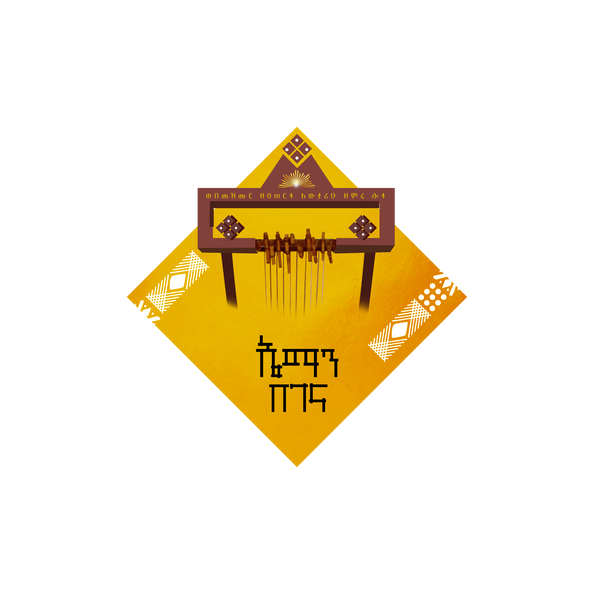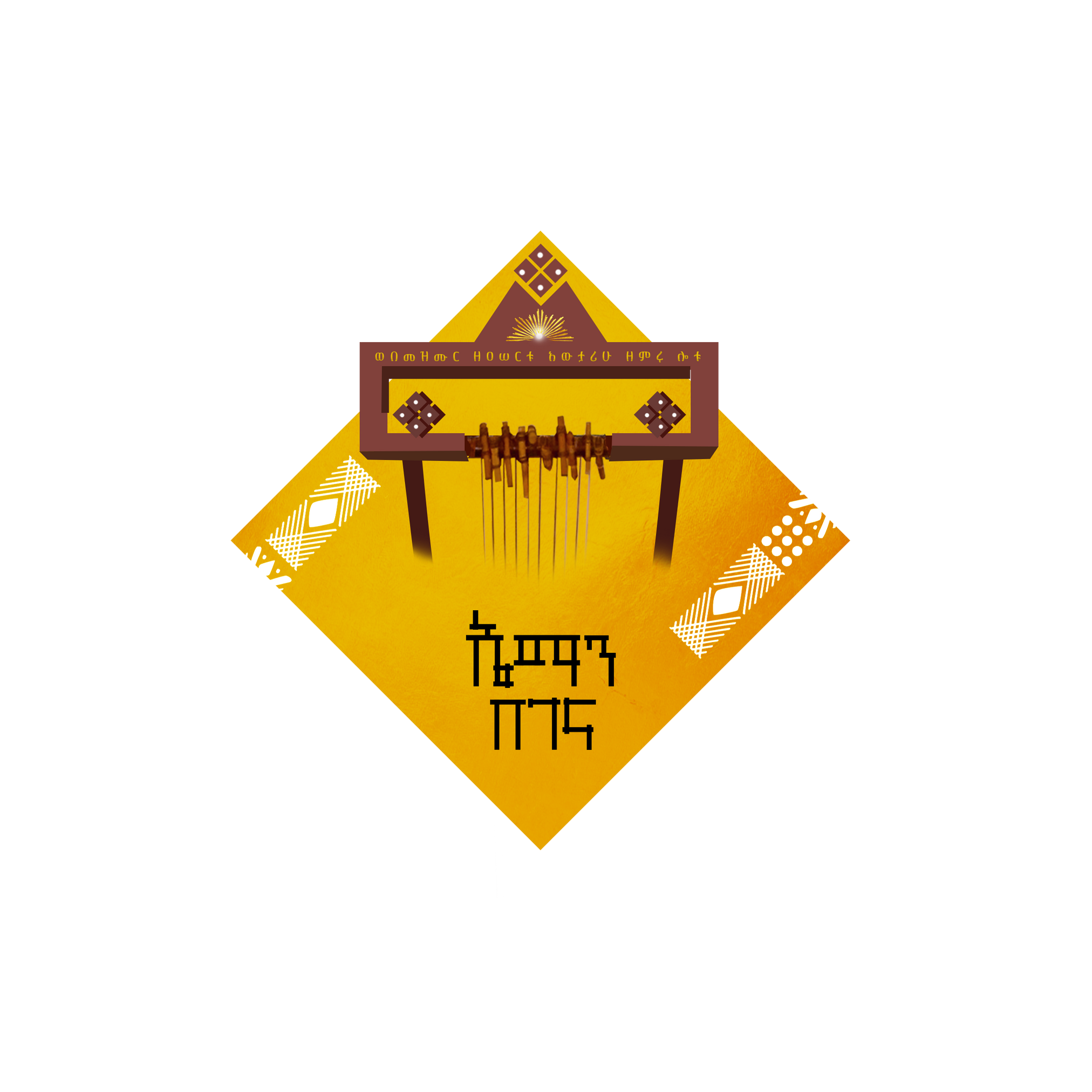
In the Name of the Father and of The Son and of The Holy Spirit, One God Amen!
Honor of the Begena ክብረ በገና
The First thing we need when we embark to learn the begena is to be mindful of what spiritual songs are saying and if they are written not just by their authors but God the Holy Spirit.
How is this relevant to the Harp of David (Begena)
The Begena is a spiritual weapon that demands care and caution. It is like a beloved and wise grandfather, just like you respect and care for your beloved grandfather and learn from their wisdom, you will learn from the Begena. But just as you handle your grandfather with extra care you should also for the Begena.
Any song brought forth to be offered in the church should be edited or overlooked by two skill sets.
1. Theological accordance to the church.
2. Knowledge of Poetry.
The Begena and the poems that are associated with it have a high regard and aims to master these two skill sets in order to present a pure offering to God.
Biblically, the Begena is mentioned in the Bible more than 50 times, mostly for praising God but sometimes to record people using the Begena for the wrong purposes.
The first place it is mentioned is in Genesis 4:21 “His Brother’s name was Jubal and he was the one who invented the psaltery and harp”
Thus Jubal is called the father of Begena. Some say that since this time the Begena has been in Ethiopia, however there are not much evidence to support this claim. The more accepted history of Begena is following the story of 1 Kings 10:1-12 and 2 Chronicles 9:1-13 and in our holy books called Fithah Negest. Which recounts the story of King Solomon and the Queen of Sheba. After the Queen returned and bore a son (King Menilik I) the boy was sent to Israel to be with his father, However wished to return to his mother’s kingdom. Thus as seen in these Bible verses, He was sent back to his country accompanied with the Ark of the Covenant (Tabote Tsion) and all of the chariots and Levites and Harpists
Which marks the time the Begena entered Ethiopia from its cradle Israel with its glory, tradition and true aim: to worship God.
Our Fathers teach us and have left us a holy tradition: that songs and teachings that will be offered in the church, should be written in prayer or after prayer, preferably with fasting. This is in order to make sure songs are not written due to our personal feelings but in accordance to God and written by God the Holy Spirit who dwells within us.
It is important to understand that serving God (especially upfront in preaching or singing) often comes with a sacrifice, if done correctly, because it is the calling that the holy apostles accomplished.
There is no service that does not require sacrifice or payment, because any service with a purpose has this nature.
Learning the Begena requires making it your purpose because it is a biblical and sacred instrument.
It is 1 of the 7 Spiritual Gifts of Saint David : Wealth of the Begena (refer to the post Begena| Adwa to see all 7)
The Key Point of this teaching is,
Our Church : The Ethiopian Orthodox Tewahedo Church because of Our Humble Fathers, great sacrifice has sacred objects like the Begena passed on to us, the question is do we have the personhood these sacred objects require?
Let the reader observe other Ethiopian instruments, they all have sacred meanings and come from the church, however as time went by most are used for secular purposes. This is due to holy relics being met with an absent minded generation. Thus restoring, keeping, and using holy instruments (spiritual weapons) in the right way and for the right purpose is the duty of the Christian who learns it. Let us look at the cradle of the Begena Israel for example, and other countries that archaeologically have depictions of having or using the begena in the past. The Church teaches us that no one before or after Saint David played the Begena in such a healing manner. However the correct Begena is Lost in his home country Israel or is not preserved correctly with its wisdom. The wisdom and the correct instrument is long gone. Even the “Harps” that are preserved have lost their spiritual essence. Thus, so that the same fate does not await us let us observe ourselves and our intentions before learning.
Our Church teaches there are three types of Begenas (string wise)
One with 8 strings: symbolizes the 8 magnificent angels
One with 12 strings: symbolizes the 12 archangels , the 12 tribes of Israel , 12 apostles
One with 10 strings (primarily preserved by the Church and still used) symbolize the 10 commandments , the 10 senses (5 seen 5 unseen)
Back to the earilier point mentioned, due to lack of responsible harpists, most of the knowledge of the begena is lost or requires more research: for example we do not know much about the 8 and 12 stringed Begenas even though they have been preserved through time.
The other parts of the Begena also symbolize great mysteries
The Two pillars symbolize: the two commands that hold all 10 commandments inside them “Love the Lord your God with all your heart and Love your Neighbor as yourself”
The two pillars also symbolize : the two archangels Gabriel and Michael
The two Pillars are held together by the ጋድም or the horizontal pillar that symbolizes Love (which holds the two commands mentioned above). It also symbolizes God as fitting because the Bible explains that God is Love.
ገበቴ or music box : symbolizes our Lady the Holy Virgin Mary: Just like the healing and unseen God became seen by coming from her womb, the unseen and healing sound of the begena comes from the music box.
በርኩማ፡ the stand that holds the strings, symbolizes Mount Sinai
እንዚራ፡ the small piece of leather that is in between the stand and the string symbolizes Baptism (receiving the Holy Spirit during Baptism) , the Begena does not make a vibrational sound without this piece.
The two types of Begena Lyrics
Begena Lyrics or Poetry have two types:
| ሰላምታ Salutations | የኅዘን ምት Beats of Sorrow |
| Greetings to God songs are mostly straightforward and focus on biblical stories and praises directly | Often used to remind one about their mortality, talks about death and the futility of life on earth. Lyrics are more poetic and have a special kind of play on words called Wax and Gold (ቅኔ፡ ሰም እና ወርቅ) |
| Praise and Prayer | wakefulness and fear of God , repentance |
Begena is a way of getting grace from God but also a burden.
Let us look at the main father of the Begena Saint David to understand this concept. Saint David sang the psalms with his harp for the Lord as a boy with a clean heart, while with his sheep and to King Saul when the evil spirits and mental illness were tormenting him as mentioned in 1 Samuel 16:14-16. But then after he sinned against God, he repented his whole life with tears. As we can see in Saint David’s life, in both cases his offering was acceptable to God.
The point is:
Begena is for Joy (ሰብኅዎ ለእግዚአብሔር)
Begena is for Sorrow
Begena is for Praise
Begena is for Repentance
Begena is for Prayer.
Prayers Before and After Playing the Begena
The Lord’s Prayer and The Magnificat (Mary’s Praise found Luke 1:46-55)
Hence, it is imperative to respect and be purposeful while playing the Begena. Begena if held with Love for God and Love for Our Lady Virgin Mary and Love for Saint David brings one to unseen spiritual heights and mental health like the saints before us.
Citation
“ክብረ በገና.” YouTube, uploaded by Ermias Begena, 7 Oct. 2022, https://youtu.be/atyBVv1_1Lo?
. "በበገና ተፈውሻለሁ."Alive Podcast YouTube 7, April 2025 https://youtu.be/i1le5U9tcSc


